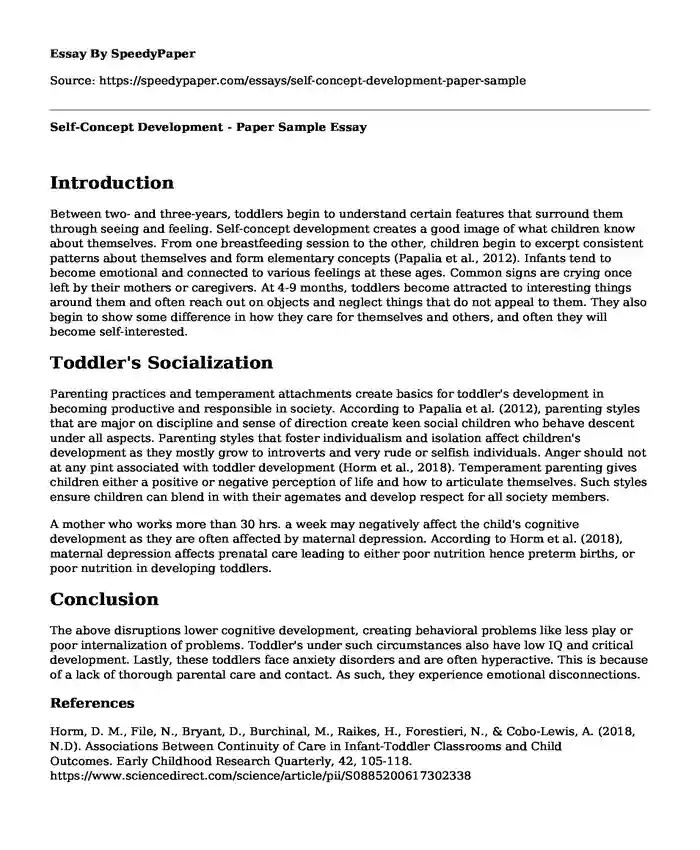
| Type of paper: | Essay |
| Categories: | Psychology Child development |
| Pages: | 2 |
| Wordcount: | 417 words |
Introduction
Between two- and three-years, toddlers begin to understand certain features that surround them through seeing and feeling. Self-concept development creates a good image of what children know about themselves. From one breastfeeding session to the other, children begin to excerpt consistent patterns about themselves and form elementary concepts (Papalia et al., 2012). Infants tend to become emotional and connected to various feelings at these ages. Common signs are crying once left by their mothers or caregivers. At 4-9 months, toddlers become attracted to interesting things around them and often reach out on objects and neglect things that do not appeal to them. They also begin to show some difference in how they care for themselves and others, and often they will become self-interested.
Toddler's Socialization
Parenting practices and temperament attachments create basics for toddler's development in becoming productive and responsible in society. According to Papalia et al. (2012), parenting styles that are major on discipline and sense of direction create keen social children who behave descent under all aspects. Parenting styles that foster individualism and isolation affect children's development as they mostly grow to introverts and very rude or selfish individuals. Anger should not at any pint associated with toddler development (Horm et al., 2018). Temperament parenting gives children either a positive or negative perception of life and how to articulate themselves. Such styles ensure children can blend in with their agemates and develop respect for all society members.
A mother who works more than 30 hrs. a week may negatively affect the child's cognitive development as they are often affected by maternal depression. According to Horm et al. (2018), maternal depression affects prenatal care leading to either poor nutrition hence preterm births, or poor nutrition in developing toddlers.
Conclusion
The above disruptions lower cognitive development, creating behavioral problems like less play or poor internalization of problems. Toddler's under such circumstances also have low IQ and critical development. Lastly, these toddlers face anxiety disorders and are often hyperactive. This is because of a lack of thorough parental care and contact. As such, they experience emotional disconnections.
References
Horm, D. M., File, N., Bryant, D., Burchinal, M., Raikes, H., Forestieri, N., & Cobo-Lewis, A. (2018, N.D). Associations Between Continuity of Care in Infant-Toddler Classrooms and Child Outcomes. Early Childhood Research Quarterly, 42, 105-118.
https://www.sciencedirect.com/science/article/pii/S0885200617302338
Papalia, D. E., Olds, S. W., Feldman, R. D., Martorell, G., & Papalia, D. E. (2012, October 4). Experience Human Development. New York: McGraw-Hill.
https://www.worldcat.org/title/experience-human-development/oclc/1027866585.
Cite this page
Self-Concept Development - Paper Sample. (2023, Dec 12). Retrieved from https://speedypaper.com/essays/self-concept-development-paper-sample
Request Removal
If you are the original author of this essay and no longer wish to have it published on the SpeedyPaper website, please click below to request its removal:
- Essay Example on Stuttering in School-Age Children
- Essay Sample on the Theme of Family Relationship in the Story "Sonny's Blues"
- Wuthering Heights. Free Essay Example
- Personality Assessment Reflection. Essay Sample
- Essay Example: Attention-Deficit/Hyperactivity Disorder (ADHD)
- Free Paper Example on Relatable Concepts to Counterfactual Thinking
- Cognitivism: Analytical Process, Internal Focus, Memory Development - Essay Sample
Popular categories




